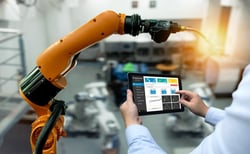Distributed control system (DCS) engineers are technical system design and process management experts. DCS engineers ensure the effective and efficient operation of distributed control systems, for example of a water treatment plant or chemical plant. They provide technical expertise regarding the system’s design, implementation, maintenance, and improvement. This work includes selecting and integrating computer hardware, software, and network components, as well as programming and configuring the system.
DCS engineers are furthermore responsible for consistently monitoring the distributed control system's performance and making necessary adjustments to ensure optimal operation. Part of a typical DCS engineer’s job description is the responsibility to create and maintain documentation about the DCS system, including user manuals, operating procedures, and training materials. DCS engineers often provide technical support to customers, including assisting with system operation, troubleshooting, and answering questions about the system.
As technology evolves, DCS engineers will continue to be responsible for upgrading systems and modifying them to meet changing plant and process needs. Distributed control system engineers are all-around experts who are vital to supporting the running of a variety of industrial processes and systems. Popular sectors for distributed control system engineers to find work in include oil and gas, nuclear energy, chemical, paper and pulp, waste and water treatment plants, food processing, agriculture, and manufacturing.
Apply now for a job as a Distributed Control System Engineer!
Commissioning Engineer
Location: 's-Gravenhage
Branche: Energy Power Plants
Expertise: Engineering & Design
Experience: 1 years
Als International Commissioning Engineer Data Centers – Electrical werk je nauw samen met een team van specialisten om ervoor te zorgen dat datacenters optimaal functioneren. Jouw taken omvatten: Het voorbereiden, plannen en uitvoeren van de inbedrijfstelling van elektrische systemen in datacenters. Het uitvoeren van functionele tests en kwaliteitscontroles. Het analyseren en oplossen van technische problemen ter plaatse. Het samenwerken met lokale en internationale teams om ervoor te zorgen dat projecten volgens planning en specificaties worden voltooid. Het opstellen van technische rapportages en documentatie. Het toezien op naleving van normen, regelgeving, wetten, kwaliteit en EHS-richtlijnen. Het fungeren als de technische vertegenwoordiger van de klant op locatie en deelnemen aan diverse commissievergaderingen en andere besluitvormingsmomenten. Het uitvoeren van site-administratieve taken zoals het plannen van werkzaamheden, het bijwerken van tekeningen in lijn met wijzigingen op locatie en het sluiten van openstaande punten in het inbedrijfstellingssysteem.
Project Engineer
Location: Rotterdam
Branche: Energy Power Plants
Expertise: Engineering & Design
Experience: 2 years
Als Project Engineer ben je verantwoordelijk voor het duurzaam, effectief en innovatief ontwerpen, aanleggen, vervangen en vastleggen van Stadswarmte, Koude en Decentrale Opwekking. Van complex ontwerp tot detailcontrole, jij bent het technisch geweten van het team en bepaalt de beste uitvoeringswijze voor projecten. Met passie voor techniek en duurzame energie ontwikkelen, realiseren en exploiteren we warmte- en koude distributienetten hierin draag je bij aan de ambitie om alle klanten van 100% duurzame warmte te voorzien. De professionele en collegiale sfeer in het team is de ideale omgeving om samen de uitdaging aan te gaan en Nederland om te schakelen naar duurzame warmtenetten.
Electrical Interface Engineer
Location: 's-Gravenhage
Branche: Energy Power Plants
Expertise: Engineering & Design
Experience: 1 years
Als Electrical Interface Engineer werk je nauw samen met het projectteam en de Lead Engineer om technische oplossingen te realiseren. Je bent verantwoordelijk voor: Ondersteunen van engineers binnen het project op technisch gebied. Oplossen en administratief afsluiten van restpunten. Meewerken aan detailontwerpen voor laag- en middenspanningsdistributiesystemen. Voorbereiden van werkpakketten voor installatie en inbedrijfstelling. Zelfstandig uitwerken van technische vraagstukken. Samenstellen van Operations & Maintenance manuals. Controleren van technische (fabrieks-) documentatie. Opstellen van technische specificaties en RFQ’s. Opleveren van technische documentatie aan de eindklant. Beheren en up-to-date houden van technische projectdocumentatie. Samenstellen van technische trainingen. Opstellen van test- en inspectieplannen.
Mechanical Engineer
Location: Eindhoven
Branche: Automotive
Expertise: Engineering & Design
Experience: 3 years
In your position as Mechanical Engineer you are responsible for development and industrialization of heavy duty automotive engines (diesel), as well as other automotive components. In team you participate and pro-active support to the project core-team, assure alignment and technical decisions in relation to project goals. We expect you to pro-actively coordinate and monitor planning and releases in line with project milestones.
Junior Calculator
Location: Wetteren
Branche: Building & Construction
Expertise: Engineering & Design
Experience: 1 years
Het bestuderen van het bestek met betrekking tot technische, veiligheids- en administratieve voorwaarden.Het voorbereiden van prijsaanvragen bij leveranciers en onderaannemers.Het uitvoeren van rekenkundige controles en plancontroles.Het bijwonen van werfbezoeken.Het verwerken van offertes van onderaannemers en leveranciers.Het ondersteunen bij het bepalen van de juiste prijs van een project, rekening houdend met risico's, eindtoeslagen voor algemene exploitatiekosten, risicodekking, winst, uitvoeringsmethoden en uitvoeringstermijnen.
Common DCS engineer roles and responsibilities
A DCS engineer is responsible for performing a range of important technical and engineering tasks. Responsibilities may include:
- Designing and implementing distributed control systems for industrial processes;
Developing software to manage systems and processes; - Ensuring systems are properly installed and configured, and that all components are working correctly, such as through troubleshooting;
- Conducting system maintenance, upgrades and modifications, including supervising contractors who work on controls systems;
- Managing projects related to the implementation and maintenance of distributed control systems, including budgeting, scheduling, and resource allocation;
- Preparing technical documentation as needed and giving trainings on DCS operations to colleagues as needed;
- Coordinating operations with internal and external teams, with ability to also lead teams in order to design and implement complex engineering solutions across all aspects of a large project;
- Providing customer support on distributed control systems;
- Safeguarding DCS security at all times;
- Ensuring safety and compliance in line with industry regulations and standards;
Qualifications for distributed control system engineer
A successful DCS engineer should have at least a Bachelor's degree in Engineering, Electronics, Computer Science, or related technical field. Supplementary training in mathematics or programming is also beneficial to those working in this field, and a Master’s degree is an advantage.
Additional supporting skills and experience include:
- 2-4+ years of related DCS engineering experience;
- Excellent applied math and technical skills;
- Proficiency in using latest DCS computer hardware and software, with a proficient knowledge of PLCs/SCADA/HMI programming languages such as Ladder Logic, Structured Text, Function Block Diagrams, and related;
- Experience in team and project management;
- Knowledge of latest cybersecurity standards;
- Strong verbal and written communication skills to be able to work easily with other engineers, technicians, and customers;
- Some work experience gained through an apprenticeship or in a relevant role is an advantage;



